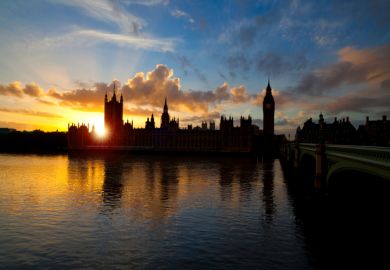The government will effectively “lose control” of the Higher Education Bill as it tries to rush through the proposed legislation pre-election and must offer major concessions “if it is not to lose its bill”, according to a senior Labour peer.
After Theresa May’s decision to call a snap election for 8 June, ministers face a race against time to pass the bill before the election.
Although Parliament will not be dissolved until 3 May, there are suggestions that 27 April has been scheduled for the closing stages of the bill.
The Higher Education and Research Bill is set to return to the House of Commons in the coming days, having been significantly amended by the House of Lords.
Key amendments inserted by peers include those preventing England’s new teaching excellence framework being used to set fees, restricting government plans to make it easier for new providers to gain degree-awarding powers (DAPs) in England, potentially further limiting entry of new providers by defining the purpose of universities, and removing international students from the government’s target to reduce net migration.
While the government would have had time to try to remove all those amendments and revert to original plans prior to Ms May’s announcement of the election, it now faces the prospect of major compromises if it wants to pass the bill through the Commons and Lords before the election.
While opponents of further marketisation of the sector will welcome the prospect of the bill being significantly altered, universities will be alarmed if any compromise deal jettisons their ability to raise fees in line with inflation based on TEF results.
The process for dealing with bills that have not completed their passage when a general election is called is known as wash-up.
Lord Stevenson of Balmacara, Labour’s shadow education spokesman in the Lords, said: “In a wash-up, the government effectively loses control of its outstanding bills.”
He added that there would be “intensive discussions” with Jo Johnson, the universities and science minister, in the coming days and that deals on the bill must be “signed and sealed by a couple of days before” 27 April.
Lord Stevenson continued: “So if it is not to lose its bill, the onus falls squarely on the government to offer something more than they already have on overseas students; the TEF; the definition of a university; and the conditions under which new entrants can gain DAPs.”
Meg Russell, professor of British and comparative politics at University College London and director of its Constitution Unit, said of the wash-up: “The basic rule of thumb is that at this stage all of the controversial bits get dropped [from outstanding bills] – there is a need for consensus between government and opposition.”
She added that the “Labour leadership in the Lords know what they are doing, and they matter in this process, as both chambers must assent”.
Professor Russell said that the process for carrying forward outstanding bills into the next session of Parliament cannot be used in the circumstances of an election. The government “would need to withdraw the bill and reintroduce a new one, starting all over again” if it was not passed prior to the election, she added.
Baroness Wolf of Dulwich, a crossbench peer who has been a key opponent of the bill in the Lords, said that if Labour “are willing to help the government get it through, then it probably will, with at least some of the Lords amendments”.
She added: “Among individual peers, I think very many people would happily see it [the bill] die, but ours is a party system and by and large party members obey their whips.”
Register to continue
Why register?
- Registration is free and only takes a moment
- Once registered, you can read 3 articles a month
- Sign up for our newsletter
Subscribe
Or subscribe for unlimited access to:
- Unlimited access to news, views, insights & reviews
- Digital editions
- Digital access to THE’s university and college rankings analysis
Already registered or a current subscriber?




